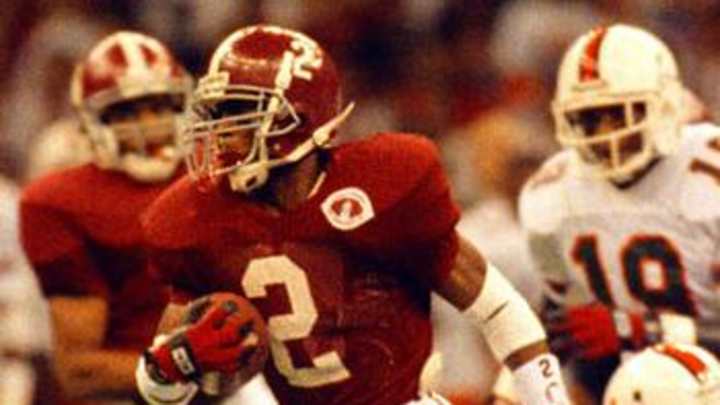Daily Dose of Crimson Tide: David Palmer

He wore No. 2, and was simply known as “The Deuce.”
But one would be hard pressed to find a more dynamic offensive player to ever wear crimson than David Palmer, whose third-place showing in Heisman Trophy voting after his junior season was at that point Alabama’s best finish to date.
It was also something Crimson Tide fans saw coming from far away. One of several true freshmen to make an immediate impact during the 11-1 1991 season, he set an Alabama record by returning three punts for touchdowns during the regular season, and another for most punt-return yards (409). Against defending national champion Colorado in the Blockbuster Bowl, which the Tide defeated 30-25, he opened the scoring with a 52-yard return and was named the “Brian Piccolo Award” as the game’s most valuable player.
Palmer began his sophomore year serving a three-game suspension, but by catching five passes for 101 yards in the first SEC Championship Game helped lead a 28-21 victory against Florida. Consequently, No. 2 Alabama was invited to play defending national champion Miami in the Sugar Bowl, where the Hurricanes were considered a sizable favorite.
“Everyone says we can't beat Miami, but we are not just anybody, we are Alabama,” Palmer said.
Of course, Alabama handily won, 34-13, to win its 12th national championship.
Palmer was even more of an offensive force his junior season, in part because Coach Gene Stallings moved him all over the field and was always looking for ways to get him the ball.
As a receiver, Palmer had 61 receptions for 1,000 yards, which at the time was a Crimson Tide record. But he also took handoffs, lined up at quarterback and handled returns, to help lead Alabama back to the SEC Championship Game (although it later had to forfeit all but one regular-season victory due to an ineligible player). Overall, he tallied 1,961 all-purpose yards.
Palmer was named an All-American, but lost out to Florida State quarterback Charlie Ward for the Heisman. Ward’s winning margin of 1,622 points over Tennessee quarterback Heath Shuler was second only to O.J. Simpson’s 1,750-point difference over Purdue’s Leroy Keyes in 1968, when more ballots were distributed. Palmer actually finished with more first-place votes, 16, than Shuler’s 10, while Marshall Faulk of San Diego State placed fourth.
A 24-10 victory against North Carolina in the Gator Bowl was Palmer’s last game wearing crimson as he decided not to return for his senior his senior season and turned pro.
“I’ve tried to look at all sides, but the bottom line is I have to fulfill the needs of me and my family,” Palmer said at a news conference.
The 5-foot-9-inch, 170-pound junior said he had reached his primary goal by helping Alabama win the national championship and called his third-place Heisman finish: “One of the highlights of my career.”
He would be selected in the second round of the subsequent draft by the Minnesota Vikings, and went on to set numerous franchise special-teams records.
Some of this post originated from "100 Things Crimson tide Fans Should Know & Do Before They Die," published by Triumph Books
